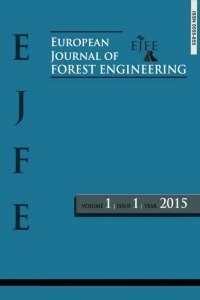About
European Journal of Forest Engineering
E-ISSN: 2149-5637
Peer Review Process
When the editorial board receives a manuscript, firstly they consider whether the topic and format is suitable for the journal and reject any discordant articles during pre-evaluation process. Besides, originality of the manuscript is verified by using one of the plagiarism detection software (iThenticate and Turnitin). Manuscript, which is within the scope of the journal and structured according to the instructions indicated in Author Guidelines section, is sent to reviewers qualified in the field to peer-review the scientific content.
To ensure the quality of research published in EJFE, peer-review process is applied according to the double-blind peer-review system in which neither reviewers’ nor author’s identities are revealed to the other parties. During peer-review process, the author will receive a list of recommended modifications that should be addressed prior to publishing. At the decision stage, three situations might occur; (1) the manuscript is accepted with minor modifications; (2) the manuscript is accepted with major modifications; (3) The manuscript is rejected and should be re-submitted.
The peer-review process is completed in two month; however, this process may be longer depending on the manuscript length and required changes. The manuscripts considered unacceptable by reviewers will not be published. The accepted manuscripts are immediately published online in journal web site.
Publisher
European Journal of Forest Engineering (EJFE) is a semi-annual peer-reviewed research journal published by Forest Engineering and Technologies Platform in Turkey.
"Forest Engineering and Technologies (FETEC) Platform" is a not-for-profit technical association founded in 2012 to strengthen the cooperation and improve communication among scientists and researchers who work under Forest Engineering Department and conduct their both educational and research-development activities in the subjects of forest harvesting, forest transportation, ergonomics, forest mechanization, forest roads, flood and avalanche control, forest road structures and bioengineering structures, and Information Technologies (ITs) in forestry.
FETC Platform aims to ensure sustainability of forest resources and multi-purpose management techniques considering appropriate production and utilization methods by using technical forestry methods, ITs, and scientific decision support systems for solving complex problems related with forestry and environment in regional, national, and global scales, and then to implement those solutions by collaborating with main stakeholders in the sector. To achieve these goals, national and international meetings have been organized by different host institutions.
The Platform conduct their studies under following work groups, considering main subjects listed above:
1. Forest harvesting
2. Forest transportation
3. Forest Roads
4. Ergonomics
5. Forest mechanization
6. Flood and avalanche control
7. Forest road structures and bioengineering structures
8. Information Technologies in forestry (GIS, RS, Photogrammetry)
It is highly anticipated that the partnership of platform members on recently initiated or completed research projects, scientific publications, and graduate thesis in the main subjects of the Platform will improve cooperation and accelerate the collaborative projects among the members of the platform

The works published in European Journal of Forest Engineering (EJFE) are licensed under a Creative Commons Attribution-NonCommercial 4.0 International License.
